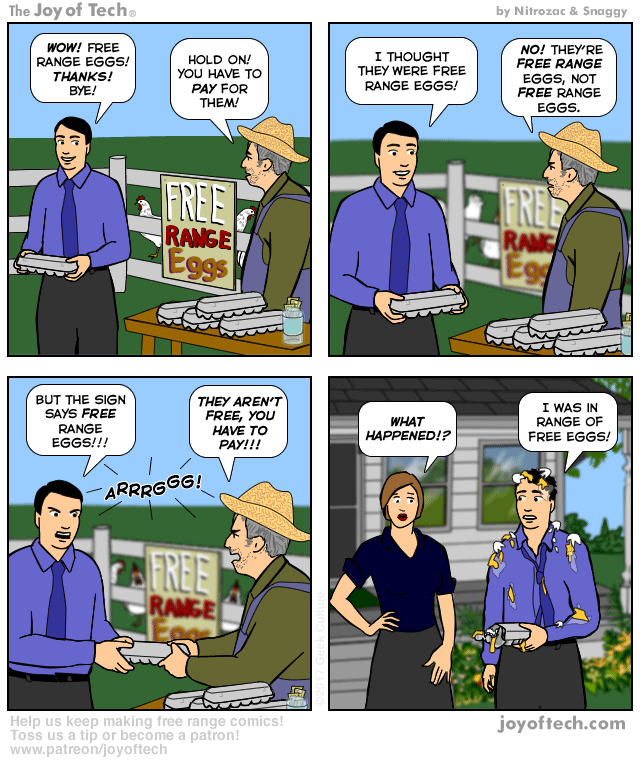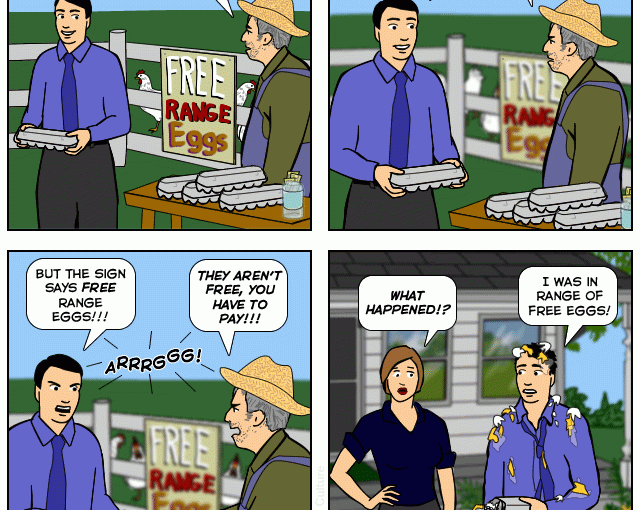Here’s a quickie. In English, “bring” and “take” are from the point of view of the speaker, not the point of view of the carrier. “Bring” is toward the speaker, “take” is away from the speaker. This is a rather mushy rule, but this Ben comic, in which the kid gets it wrong, definitely feels wrong to a native speaker, so it should help you remember how to use those two words.
Author: Patricia Nelson
They call it Clutter, I call it Fluff
Here’s the headline to a pretty good article about writing.
Clutter
How toremoveextrawords that make yousoundboring
I quoted it because they jimmied up the graphics to make it hard to copy and paste, so you’ll have to follow the link in my first line to see what the formatting looks like.
The article is a pretty good read, even with an incorrect adverb in the first line of the first paragraph. I agree with what the writer says we should do when we write, but the motivation I offer is not about being boring (that’s egotistical), but about whether the reader can absorb the content of the writing without thinking about the writing itself. That’s getting the job done. Here are a few places where I mentioned this concept before: here, here, here, and here.
Prepositions are Tricky
This probably seems a minor quibble, but the first panel in this comic has the wrong preposition. It should be “on” or “about.”
You pretty much need to be a native speaker of the language to get prepositions right all the time (and even then, you can find geographical differences, say, between the US and UK).
I don’t have a good solution, either. Maybe try googling phrases like “preposition for thesis topic.” Or ask a curmudgeon.
Two Harrumpfs
No comic today, but something to think about.
My second gold rule of writing is to be correct. This from This Day in History for July 20:
In December of the same year, Apollo 8 took three astronauts to the dark side of the moon and back, and in March 1969 Apollo 9 tested the lunar module for the first time while in Earth orbit.
The whole moon is dark half the time! They went to the FAR side of the moon! I know, “dark” is a synonym for “unknown,” and I presume they were using a professional writer who decided to write, um, informally. Still, why not be accurate?
While I’m at it, here’s another example of bad writing from the same article:
After traveling 240,000 miles in 76 hours, Apollo 11 entered into a lunar orbit on July 19.
“Into” is unnecessary. (It’s redundant. “Entering” includes the idea of going into.) I call this kind of mistake “fluff.” It goes against my third rule, to be concise. If you don’t need a word, don’t use it.
Double harrumpf.
ASL Question
Maybe I’m passing up a good opportunity here; after all, this comic is even about a point of grammar. But I’ve mentioned that solecism enough times that both of you dear readers should know how to get “your” and “you’re” correct by now, right?
Here’s today’s Dustin:
So here’s my question. Well, two: Putting your fingers in an “L” shape against your forehead is a sign in American Sign Language. What does the sign mean? and does it matter which hand you use?
If you happen to know, send me a note in the comments, would you?
This is Why We Have Hyphenated Adjectives
We call them compound adjectives. Sometimes when you have two (or more) adjectives before a noun they both refer to the noun. The big red boat, for example.
But sometimes the first adjective refers to the second adjective, and together they modify the noun. Black-eyed Susan, for example.
So here’s a comic to illustrate what might happen when you forget that hyphen.

Mightn’t you say that the first adjective is really an adverb? After all, don’t adverbs modify verbs, adjectives, and other adverbs? Good point. That’s why we use the hyphen, to show that two adjectives are working together. If you used an actual adverb, you wouldn’t need the hyphen. A messily ruined shirt, for example. No hyphen.
Some Words go Two Ways
Some common words are one word when they’re adjectives and two words when they are nouns. Lots of text in this comic, but look at the bottom full line in the second panel.
“Everyday” as one word is an adjective! What she means is “every day.”
Here are a couple more that come to mind:
- altogether, all together;
- already, all ready;
- alright, all right;
- aftermath, after math. (Okay, not many are likely to confuse those two.)
Can you make a couple correct sentences with them? Can you list a few more such words? (Put them in the comments.)
That third one is particularly irritating to me. Here’s a good quote about it:
Word Fact: Alright vs. All Right. … The form alright is a one-word spelling of the phrase all right. Alright is commonly used in written dialogue and informal writing, but all right is the only acceptable form in edited writing. Basically, it is not all right to use alright in place of all right in standard English.
Shameless Plug—for Somebody Else
I’ve recommended A Word A Day a couple times in the past (and still do), and someone once asked about places to post their short stories, so I posted links to a few sites, and I always give credit when I quote comics (and usually other sites, unless it would embarrass them). Recently another site has been posting links to this site! I confess that I’m flattered, even though sometimes this sort of thing is a racket of some kind.
Well, the site is legit. At least I’m not the only one he mentions, and he stays on the topic of technical writing a lot. It’s an effort to have a social network site for tech writers. In fact, I joined up a long time ago and then forgot I had done so! Too busy tech writing, I guess.
Anyway, I’ll return the favor and post a link to his site:
Technical Writing World.
Give it a look. Maybe sign up.
Two Ways to do a Pun
I was going to continue with serious lessons, but today I ran into two comics that are not only both on the same topic, but they illustrate one of the finer points of punning.
Type 1: When the pronunciation of the misused words is the same,
https://comicskingdom.com/crankshaft/2017-07-13
Type 2: When the pronunciation is almost the same,
https://comicskingdom.com/take-it-from-the-tinkersons/2017-07-13
Which reminds me of my sister’s favorite pun, which goes something like this: “I thought that was water dripping from your nose, but it’s not.”
She has a fiendish laugh to go with it.
Compound What?
Here’s a sentence. Is it right or wrong? (Maybe I should say, “Is the grammar correct?”)
While Subversion is still primarily a copy-modify-merge system, it still recognizes the need to lock an occasional file and thus provide mechanisms for this.
I saw this in some instructional material for a file management program named Subversion. (Yes, the first word should be “Although,” but that’s not the thing I’m thinking about.) What about “provide”? Shouldn’t it be “provides” to go with “recognizes”? After all, the subject of the sentence is “it,” right?
Well, yes, the word could be “provides” to go with the singular subject. But the sentence is correct nonetheless! Can you tell why?
Because instead of the sentence having a compound predicate, it has a compound infinitive! It’s “to lock” and “to provide.” That “to” serves both words.
This is one of those (rare) cases where no matter which you do, you’re right!
